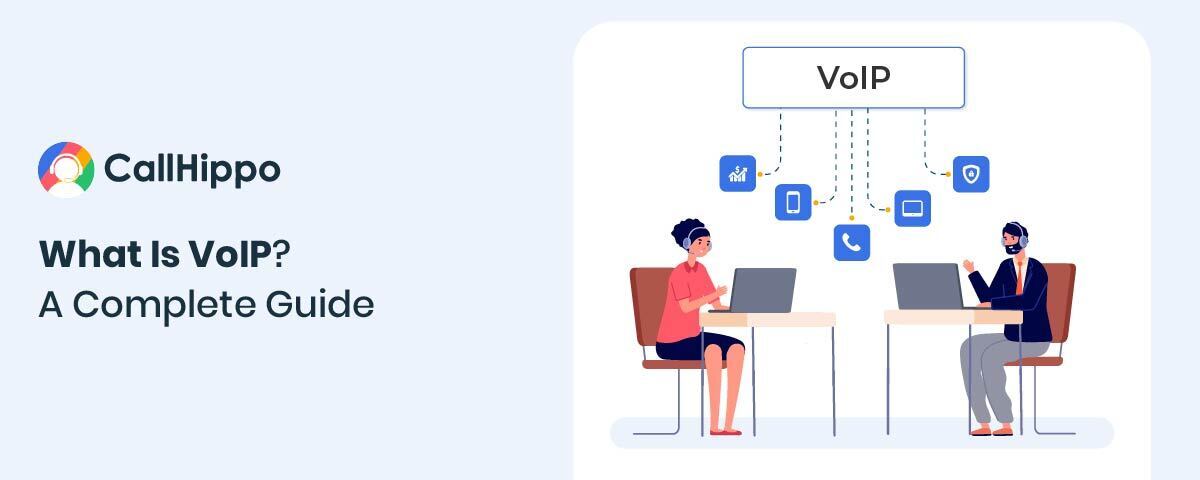We are living in a hyper-digitalized world where technology has permeated every aspect of life. VOIP system is now a significant component of daily business communications, and the various features of VoIP solutions have certainly made task management exceptionally simple and structured.
In this blog, we’ll understand what is VoIP, how it works, and the advantages and disadvantages of VoIP, among other things. Let’s start.
What Is VoIP?
VoIP is a technology that allows organizations to make and receive calls over the Internet and to conduct multiple advanced customer support activities like call forwarding, call queuing, call monitoring and analysis, and so on.
When anyone signs up for VoIP, they do not have to worry about the operating location, unlike when they use phone lines, since VoIP number offers a form of omnipresence or worldwide accessibility to users as it works on the internet connection. Moreover, VoIP is not only simple to set up and use, but it also includes a variety of communication features like video conferencing, conference calls, instant messages, auto-attendants, call routing, call monitoring, analytics, and so on.
Overall, it is an advanced phone system that is highly reliable, adaptable, cost-effective, and portable. Unlike traditional phone systems, you don’t have to spend loads of money on equipment, installation, and maintenance since VoIP is a cloud-based phone system, meaning everything is managed by the service provider.
Now, let’s move on to the next section and learn how VoIP works.
How Does VoIP Work?
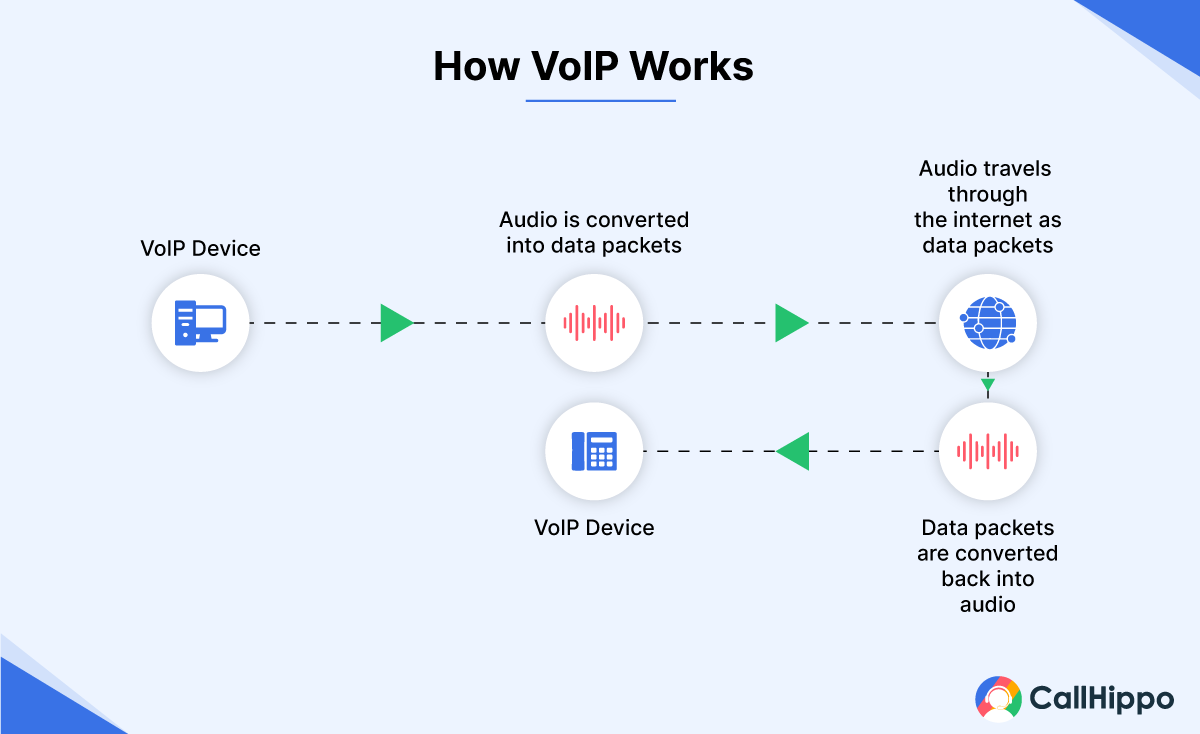
The functioning of a VoIP modern phone system is quite simple, as explained below:
- Conversion of the voice by an IP phone or ATA (Analog Telephone Adapter) from an analog signal to a digital signal.
- The same is then sent in data packets to a location closer to the destination (over the Internet/broadband).
- The voice will then be converted back to an analog signal over a traditional circuit switch (PSTN).
This allows your calls to be received by both traditional telephones and other VoIP users around the world. However, there are several different types of VoIP phone numbers, each serving a specific purpose. Let’s look at how they differ and which is best.
Top 5 Features of VoIP
The following are the top five features of VoIP-
1. Interactive Voice Response (IVR)
Most VOIP providers include interactive voice response as a premium facility in their platforms. This facility vastly reduces dependency on manual staff as automated voice menus can help customers direct themselves to the appropriate departments or extension numbers.
Automated voice response ensures no delays in your service and enables you to provide excellent support.
They save companies the hassle of investing in a front desk for their office to take care of incoming calls. Interactive voice response is a user-friendly option that helps customers solve their issues at any time of the day.
2. Video Call Conference
From time to time, organizations need their employees to communicate with partners, clients, and stakeholders who may be scattered in different geographic locations. The conference calling feature seamlessly connects team members in real time to collaborate on work-related issues.
Video call conferencing enables employees to communicate freely with various stakeholders, no matter where they are, and make informed decisions for the company’s betterment. Conference calling is a highly advantageous feature as it increases availability, eliminates physical distances, and ensures maximum connectivity.
3. Call Queuing
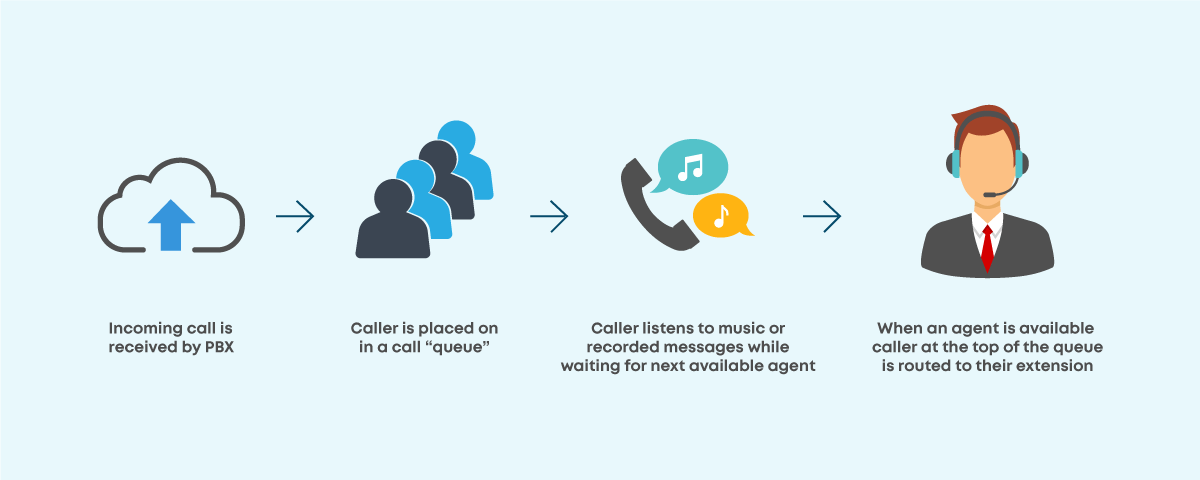
Call queuing indeed is one of the most significant features in VoIP. The call queuing system is especially prevalent amongst organizations with a large customer base. It streamlines caller queues to minimize wait time and ensures that calls are attended by available support staff at the earliest.
Call queuing systems can also play personalized greetings and music for clients to make the wait more pleasant. An effective call queuing system is the key to providing flexible and proactive support. It is the best way to deal with heavy call traffic and keeps customers satisfied with the power of fast-paced service.
4. Call Transfer
The customer is undoubtedly a king in today’s competitive market, and organizations need to up their communication game to stay connected with their valuable clients. One of the most beneficial new features in VoIP tools is the call transfer feature.
It allows you to forward important phone calls to any mobile number, personal phone number, or landline number. Customers do not have to struggle to contact support staff members as calls are automatically redirected to an available line.
Call transfer enhances your business’ accessibility around the clock and ensures that your team members can attend calls even when they are on the move.
5. Call Barging
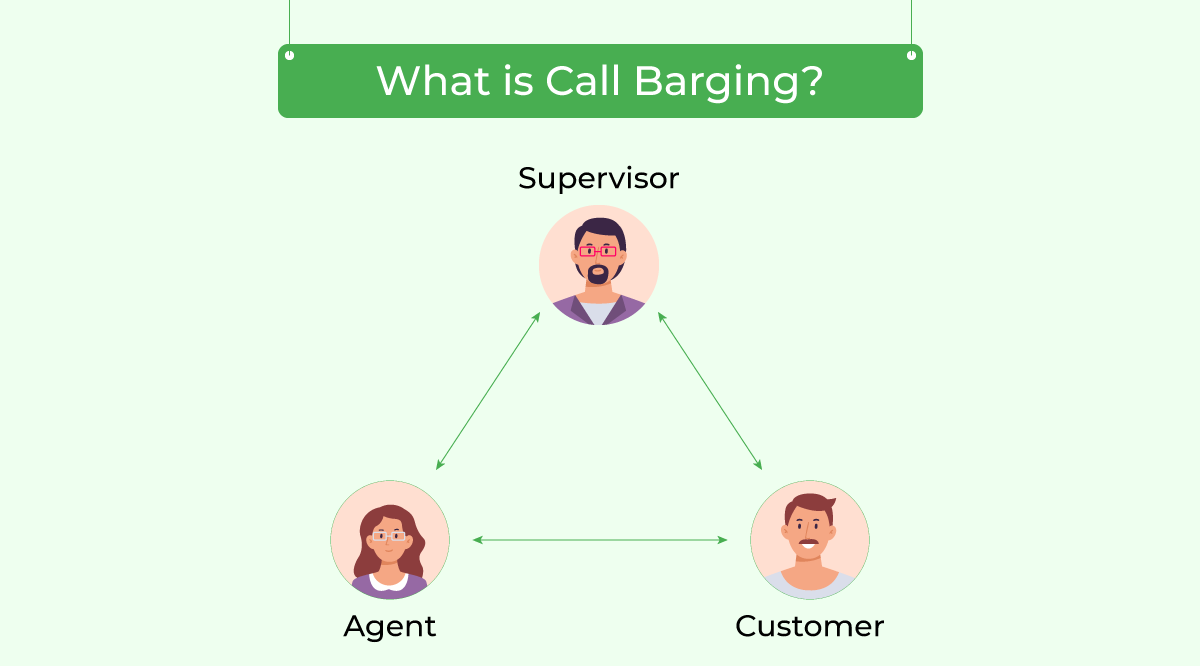
A typical facility that is now provided by most of the top cloud-based phone system service providers is call barging. It allows a third party to overhear conversations and enter a two-way call if required. Call barging is a highly useful feature of virtual phone numbers as it enables companies to monitor the service being provided to clients.
Call barging is a handy tool for training new support team representatives. It is indeed one of the best features of VOIP, especially for organizations that deal with a large volume of daily calls.
Let’s continue on our VoIP voyage and learn about the key advantages of VoIP.
Advantages of Using VoIP
The primary reason organizations are switching from traditional phone systems to VoIP is because of the multiple advantages it offers. VoIP has many advantages, including scalability, flexibility, cost savings, improved voice quality, portability, and multitasking.
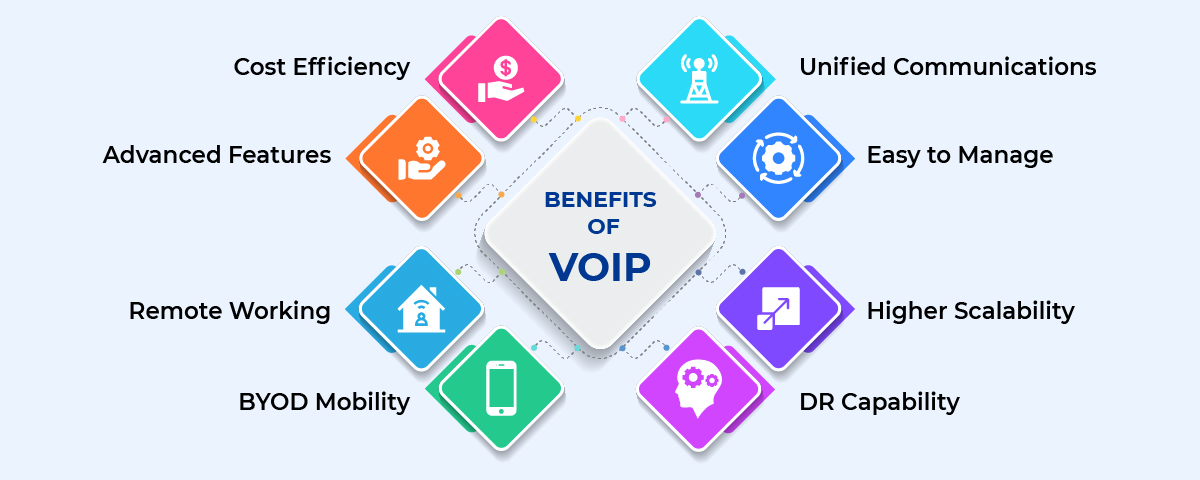
Let’s take a quick look at each of these benefits and understand what is VoIP used for.
1. Offers On-Demand Scalability
The first key advantage of VoIP is its scalability. VoIP, being a cloud-based phone system, allows you to grow the service or resources as needed. You do not need to buy the entire package at the beginning. Instead, you can buy the bare minimum of resources and then scale them up as your business grows. Ultimately, it allows you to pay for only the resources that you consume.
2. Improves Voice Quality
Another reason organizations are switching from traditional phone systems to VoIP is voice quality. Since VoIP operates over the Internet, there is very little possibility that the network will be disrupted or damaged. As a result, the voice quality delivered by VoIP platforms is always far superior to that of traditional phone systems. There is minimal voice interruption, ensuring that the message reaches its destination intact and in excellent quality.
3. Allows Multitasking
Another significant advantage of VoIP is the opportunity to multitask. That is, you can process data and share it with your team or another department while handling the call. In addition to call management, the system allows you to perform a variety of tasks, such as instant messaging, customer analysis, strategy planning, sending faxes, organizing video conferences, and scheduling meetings.
4. Provides Better Mobility
The capacity to work from anywhere is referred to as mobility. In comparison to traditional phone systems, VoIP provides an excellent level of portability since it functions via the Internet. All you need to use the VoIP service is an internet connection and an IP phone.
You can manage your clients’ calls from anywhere in the world if you have these two. This will eventually improve both the customer experience and productivity in the long run.
5. Reduces Overall Operational Cost
Another significant reason why organizations should use VoIP is to save money. VoIP saves money on call costs and cuts costs on various other expenses, as explained below:
- Staffing cost– Unlike traditional phone lines, VoIP does not demand PBX experts and receptionists. It uses Internet technologies and can be managed by your existing IT team.
- Equipment cost– Instead of an IP PBX kit with VoIP in the cloud, all you need are handsets. This is especially useful for small businesses that can leverage the saved cost in multiple ways.
- Copper wiring– This can be a recurring cost that is still stuck with traditional phone systems. With VoIP, all you need is- devices connected to the internet.
- Switching costs– You can save a lot of bucks when making the switch. VoIP solutions do not require any special equipment, as the provider hosts all of the equipment.
- Scalability– In traditional PBX, circuit upgradation is highly expensive. Whereas, while upgrading VoIP lines, you just have to upgrade your internet connectivity.
- Call Costs– With VoIP, distance is never a concern. Telecom providers often charge high rates for long-distance and international calls. At the same time, VoIP providers offer practical plans that offer long-distance calls at minimal rates.
- Setup Fees– Finally, VoIP comes with a low setup cost as it is very easy to set up a VoIP phone, and that is because setting up a new customer happens with the click of a mouse.
So these are the five primary advantages that have made VoIP a popular phone system across all industries of all sizes and scales. This means that if your company has not yet invested in VoIP software, you should do so right away.
This modern technology will not only help you improve your business operations, but it will also help you automate repetitive processes and organize a structured workflow that ensures maximum output and minimum error.
Disadvantages Of Using VoIP
VoIP phones have several benefits, but they also have some drawbacks. Let’s take a look:
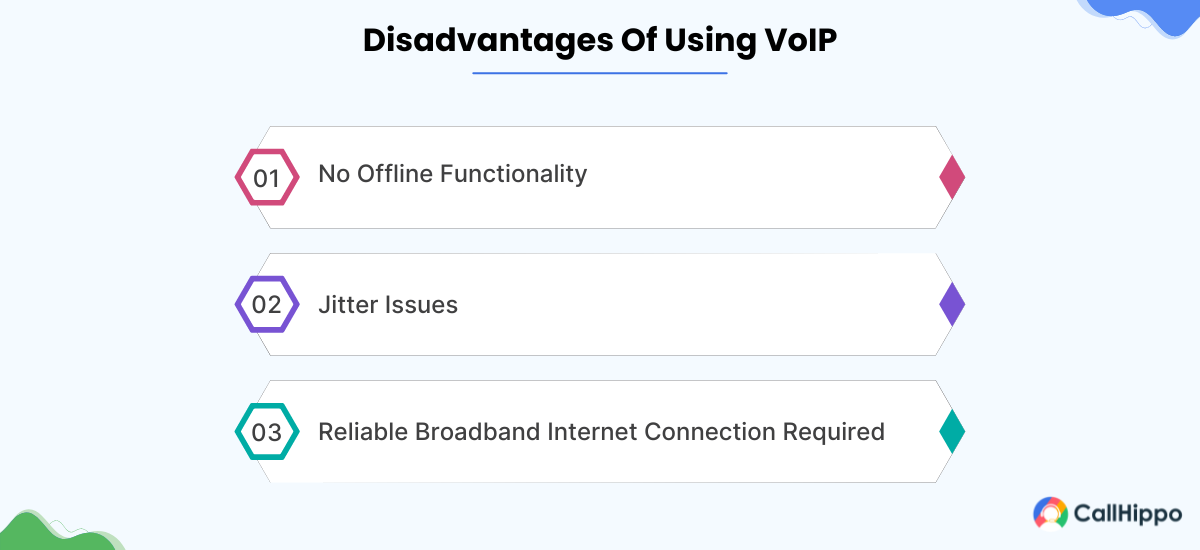
1. No Offline Functionality
Your clients and team members might not be able to get in touch with you right away using computers or other mobile devices if you’re in a place without the internet or have a power outage.
However, VoIP systems can divert callers to voicemail even when you’re not online, offering the opportunity to return calls later.
2. Jitter Issues
VoIP services encrypt the voice and send it as individual “data packets.” When these packets arrive on time and in the right order, clear communication takes place. Jitter, on the other hand, can result in packet delivery delays, which leads to choppy audio and other problems with call quality.
A bad internet connection causes the jitter. It requires less bandwidth than video conferencing. However, to minimize this problem, a fast internet connection is necessary.
3. Reliable Broadband Internet Connection Required
Your internet bandwidth influences VoIP call quality. Every device typically requires an upload speed of at least 100 Kbps and a connection with jitter and ping times of less than 70 ms. These parameters can be measured with technologies like Bandwidth Place.
The following are the top VoIP internet connections:
- Fiber optic internet
- DSL (digital subscriber line).
- Fixed wireless internet,
- Cable
- Business-grade internet and
- 5G mobile broadband internet
Users must stay away from satellite internet as it can have higher latency and lesser bandwidth, causing delays in voice calls because of the great distances that radio waves have to travel.
Pro Tip: Ensure optimal VoIP performance by investing in a reliable internet connection. For high-quality calls, use fiber optic, cable, or business-grade internet. Avoid satellite internet due to latency issues. This way, you can take full advantage of VoIP’s features like call forwarding and conferencing without disruptions.
Difference Between VoIP vs. Landline
A traditional phone system uses a copper telephone network to send and receive calls, and VoIP technology allows high-quality voice connections over the Internet. VoIP can be deployed and operated remotely over the cloud and accessed via a dashboard on the computer or mobile device, minimizing the need for installation or maintenance on-site.
Instead of contacting an expert, users can make software changes to add or remove users. VoIP is preferred by businesses because of its greater feature set and improved calling standards, which eliminate the need to set up an expensive on-premises private branch exchange (PBX).
Here are some key differences when comparing VoIP vs. landline:
| Functionality | VoIP | Landlines |
| Phone calls (PSTN) | Yes | Yes |
| Nationwide long-distance | Included | Optional |
| User-to-user calls | Yes | PBX required |
| Caller ID | Yes | Yes |
| Call Waiting | Yes | Yes |
| Ease of setup | ????? | ??? |
| Requires internet | Yes | No |
| Wireless | Available | Available |
| Reliability during internet/ power outages | Calls can be routed to another number or voicemail. | Calls drop or are routed to voicemail. |
| Technology | IP telephony (SIP, TLS, and SRTP) | Analog voice signals |
| Call quality | ????? | ???? |
| Setup cost | $0 | $110 per jack |
| Monthly cost | $18-42 | $35 |
| Advanced features | ||
| Auto attendant | Included | PBX required |
| Phone number privacy | Included | Varies |
| Phone number changes | Included | $27 |
| Phone extensions & hunt groups | Included | PBX required |
| Conferencing | Included | Three-Way Calling |
| Call routing | Included | $9.95/mo |
| Call queuing | Add-on | Add-on |
| Remote work capable | Yes, softphone apps | Call forwarding |
| Call encryption | Yes (TLS & SRTP) | No |
| International dialing | Yes | Yes |
| Business voicemail | Included | $13.95/mo |
| Integrations (CRM, text messaging, surveys) | Yes | No |
This table outlines the key distinctions and benefits of using VoIP provider CallHippo’s services compared to traditional landline phones.
Step By Step Guide To Get VoIP from CallHippo
So, if you are convinced and ready to get VoIP calls or collaborate with the best VoIP service provider, we recommend that you choose CallHippo. To sign up for CallHippo VoIP services, simply follow the steps outlined below:
Step 1: Sign up with CallHippo.
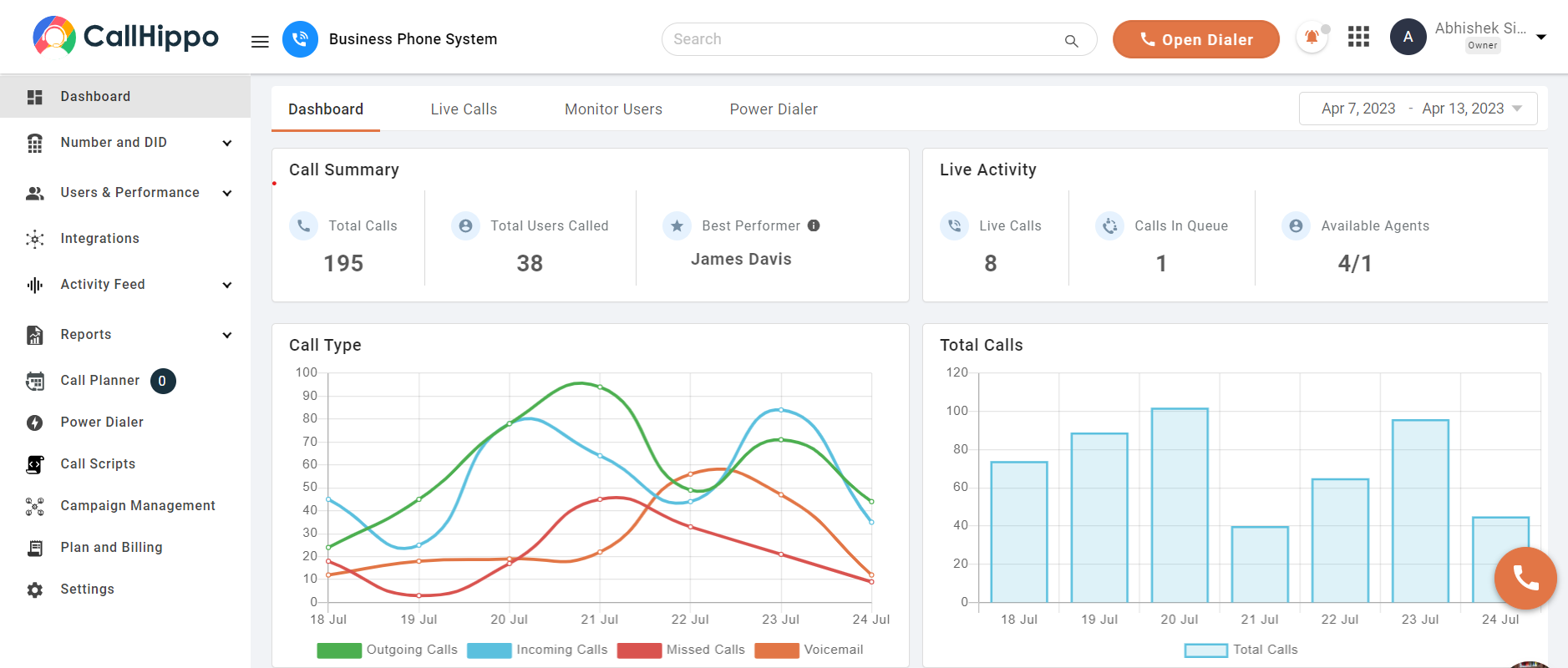
Step 2: Log in with the username and password, and this will take you to the dashboard.
Step 3: Click on ‘Add Number,’ select the US or any other countries that you want to target in the ‘Country’ column. After that, you can filter the numbers as per your choice and select a number from the number pool.
Step 4: Make payment.
Step 5: Once you’ve established a centralized virtual phone number, you’ll need to add the rest of your team members.
After that, you must link your phone number to the virtual number. This enables you to make and receive calls from the country whose phone number you have chosen. That’s it! However, keep in mind that the users who will be responding to the calls must first be entered into the system.
This brings us to the end of the VoIP system guide. We are optimistic that this information will help you better understand the use of VoIP modern phone systems.
The Bottom Line: VoIP (Voice over Internet Protocol) is one of the most important communication technologies required by modern enterprises. The solution will benefit in a variety of ways, including improving customer service and satisfaction, automating and streamlining operations, and closing gaps in the work process. We propose that you subscribe to one of the best VoIP service providers, CallHippo, right away if you are planning to go global, want to give superior service, or want to ensure business success.
Frequently Asked Questions
Can VoIP be used for faxing?
Yes, VoIP can be used for faxing through a feature called FoIP (Fax over IP). This service allows you to send and receive faxes over your internet connection.
Is VoIP secure?
VoIP can be secure if it uses encryption protocols such as TLS (Transport Layer Security) and SRTP (Secure Real-Time Transport Protocol). These protocols help protect your calls from eavesdropping and other security threats.
Can I keep my existing phone number when switching to VoIP?
Yes, most VoIP providers, including CallHippo, offer number portability, allowing you to keep your existing phone number when transitioning from a traditional phone system to VoIP.
What devices can I use with VoIP?
VoIP can be used with a variety of devices, including IP phones, computers, smartphones, and tablets. You can also use analog telephone adapters (ATAs) to connect traditional phones to a VoIP network.
Does VoIP support emergency calls?
VoIP services can support emergency calls, but it’s important to provide your VoIP provider with your current address so they can accurately route your call to the nearest emergency center.

Subscribe to our newsletter & never miss our latest news and promotions.







